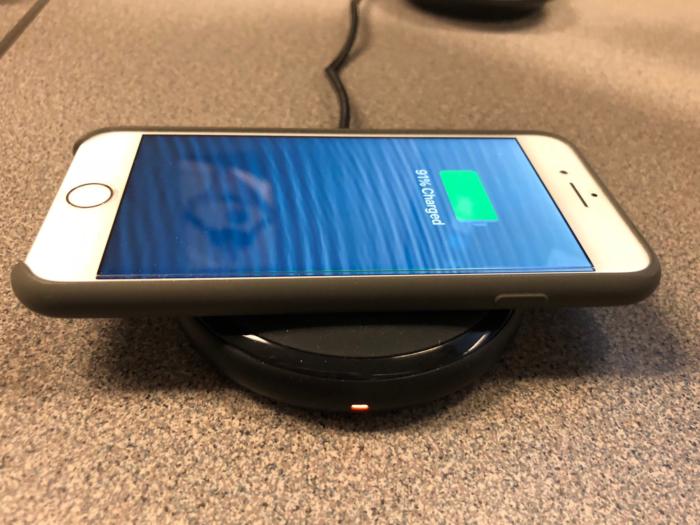































The European Union (EU) mandate that makers of most mobile devices use USB-C by fall 2024 has turned up the heat on speculation Apple might just go all wireless in future models of its iPhone and AirPods.
While the directive from an EU Parliament committee applies to all manufacturers of mobile electronics, the unprecedented requirement is expected to directly affect Apple, whose products - including the popular iPhone - use the company's proprietary Lightning connector protocol.
The mandate is clear: "Mobile phones, tablets, e-readers, earbuds, digital cameras, headphones and headsets, handheld videogame consoles and portable speakers that are rechargeable via a wired cable will have to be equipped with a USB Type-C port, regardless of their manufacturer."
The move means iPhones and AirPods sold in the EU will be required to switch to the more ubiquitous USB-C ports and cable connectors by the fall of 2024. The mandate leaves Apple with several options, including going all wireless.
"The new rules only cover charging via a wire. If a device is not charged via a wire there will be no obligation to have a USB type C port," a European Parlaiment source said in an email response toComputerworld. "As wireless technologies still need time to be developed, 24 months after the entry into force of the Directive, the EU Commission will ask European standardisation bodies to develop a standard for wireless as well - so this could change in the future but not now."
 IDG/Ken Mingis
IDG/Ken Mingis An iPhone 8 being charged atop a wireless charger from RavPower, which is capable of transmitting up to 7.5W of power.
Forrester Senior Analyst Andrew Cornwall said the EU move leaves at least three paths for Apple to take.
"It's in character for Apple to remove the charge/Lightning port altogether in favor of wireless charging, thus avoiding the EU law," Cornwall said. "Since their wireless charger supports an open standard, they won't run afoul of future delegated acts.
"Apple appears to have anticipated the EU law and is ready to move to wireless charging with the Qi standard," Cornwall said. "Data transfer will be wireless only. The Lightning port will disappear from future iPhones just as the headphone jack did."
Apple analyst Ming-Chi Kuo, however, believes Apple is already planning for USB-C on the iPhone 15 when it launches in the second half of 2023. So shipping an all-wireless charging phone would have to follow in that scenario. The iPhone 14 line-up, expected in September, is almost certain to continue using a Lightning connector, he tweeted.
The EU directive also allows manufacturers to skip including any charger with their devices. That's because once all manufacturers are on the same charging standard, shipping a charger with every product would be superfluous. It's an attribute the European Parliament called out in its statement on the directive.
That will undoubtedly hurt some buyers - the few who don't have any chargers will need to pay more, Cornwall pointed out.
"There is increased danger that warranty repairs could be refused due to 'bad chargers.' Some may buy shoddy chargers that cause fires," he said. "Travelers will need to carry a dongle for charging until hotels widely implement Qi."
And if Apple's Lightning port disappears for data transfer, Apple users will lose some privacy, as it's a lot harder to intercept wire traffic than something over the air, Cornwall noted. Additionally, some iPhones may become harder to repair, and reflashing an iPhone, or restoring it to its original firmware, may become impossible. And jailbreaking an all-wireless iPhone -that may no longer work, either.
On the flip side, iPhones might be easier to waterproof with the port eliminated.
"I see the EU law as being mildly inconvenient for consumers," Cornwall said. "It's mildly favorable to device vendors, who no longer have to include a charger with every sale."
Jack Gold, principal analyst with J. Gold Associates, questioned whether the EU directive would allow Apple to remove a port altogether, because the mandate calls for vendors to move over to USB-C. Additionally, there are still several challenges with wireless charging -the first being that it's not as energy efficient.
"There is a good deal of loss in the wireless charging - as much as 50%," Gold said. "And you are limited as to how much power you can push through the wireless charger. So, rapid charging that we've all gotten used to is very hard to do in wireless. It's probably why Apple has not pushed forward with wireless charging in a big way for their phones."
So, the question is, would users accept slower charging?
"My guess is that Apple will resist going full wireless charging big time until they can solve some of these problems. But physics is against them and it would take some serious breakthroughs to change things. Apple users have expectations of Apple that they might not be able to meet with wireless charging as the only option."
 Tags quentes :
Maçã
Pequenas e Médias Empresas
Telemóvel
iPhone
Ios
Gerenciamento móvel corporativo
Tags quentes :
Maçã
Pequenas e Médias Empresas
Telemóvel
iPhone
Ios
Gerenciamento móvel corporativo